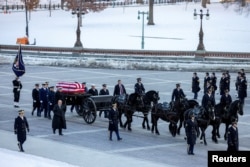U.S. lawmakers honored Jimmy Carter on Tuesday, as the body of the nation's 39th president arrived to lie in state in the U.S. Capitol.
"Today, we gather to celebrate the life of a man whose works will echo for generations to come," Vice President Kamala Harris said to the distinguished guests and members of Carter's family assembled in the U.S. Capitol Rotunda.
Carter, a one-term Democratic president and Nobel Peace Prize winner, will lie in state in Washington for two days, allowing the American public to pay its final respects.
Harris recognized Carter's role in brokering the Camp David Accords, instituting ethics reforms and founding the departments of Education and Energy.
Congressional leadership also recalled his presidency, which occurred during a tumultuous time in American history.
"President Carter's life, his selfless service, his fight against cancer and his lasting contributions to his fellow man are all truly remarkable," Speaker of the House Mike Johnson said. "President Carter was willing to roll up his own sleeves to serve and get the job done."
Senate Minority Leader Chuck Schumer said on the Senate floor earlier Tuesday that Carter was "one of the most decent men ever to hold the office of president. He was a gentleman in every sense of the word: kind, honorable, intelligent, humble, deeply patriotic. These are the virtues he brought to the Oval Office, in an era where trust in government was arguably at a low in the 20th century."
Carter's presidency began while the nation was still recovering from the aftermath of the Vietnam War and the Watergate scandal, the latter of which resulted in the resignation of President Richard Nixon and the decline of American trust in public institutions.
Carter's term (1977-1981) was marked by economic inflation and crises in Iran and Afghanistan.
"President Carter was a man who served his country. He loved America. I didn't agree with all of his policies, but you could agree with his patriotism," Republican Representative Ralph Norman told VOA.
Carter was the longest-living U.S. president, dying at 100 years old. His post-White House career traveling the world engaged in diplomacy and charity work redefined how American presidents lived after their terms in office.
"Jimmy Carter had a presidency at a time of tumult — the Iranian hostage crisis, inflation. Frankly, not dissimilar to Joe Biden's presidency in some respects," Republican Representative Mike Lawler told VOA. "But I think Jimmy Carter has always been viewed by the American people as a decent man, someone who really cared deeply about this country and its people and certainly in his post-presidential life was very focused on what he could do to help the American people and his work with Habitat for Humanity."
According to the Architect of the Capitol, only 46 individuals have lain in state or in honor in the U.S. Capitol Rotunda since the nation's founding. Carter's remains will return to his home state of Georgia on Thursday for a private family burial.
Kateryna Lisunova and Mykhailo Komadovsky contributed to this report.






